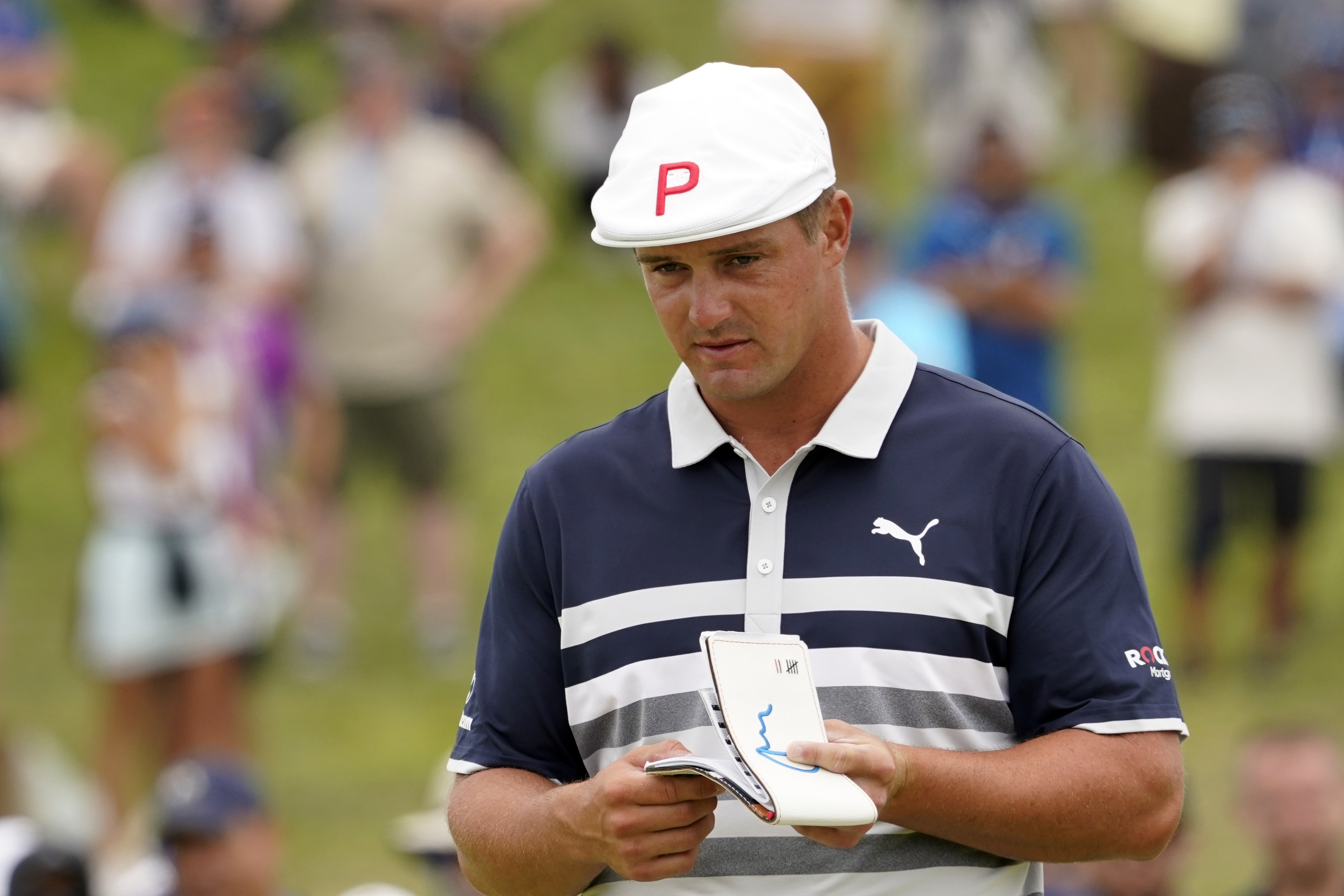SAN DIEGO – Bryson DeChambeau understands math, probabilities and playing the odds. He has fully committed himself to a strategy that he thinks will give him the best chance of making more birdies and winning more tournaments.
It’s unconventional, and to some, foolish, but he’s gone all-in. DeChambeau has transformed his body, added speed, and he uses his power to take lines on the course that no one else tries. He goes for angles that outwardly seem audacious both off the tee and from the fairway.
When things go well, he looks like a card shark at the blackjack table. Miraculously, everything goes his way. That’s what happened last year at Winged Foot when he won the U.S. Open by six and was the only player to finish under par.
On Sunday at Torrey Pines, the breaks stopped going DeChambeau’s way—in his eyes—and a back-nine 44 dropped him from the top of the leaderboard with 10 holes to play at Torrey Pines into a tie for 26th at the end of the day.
His final score for the day, 77. In golf slang, hockey sticks.
U.S. Open: Leaderboard | Photos | Money | Winner’s bag
The defense mechanisms and rationalizations of his round followed shortly after DeChambeau signed his card. He said that he had struggled to hit the ball well all week at Torrey Pines, but today, on the back nine, that poor ball-striking combined with bad luck.
“Nobody understands, at least if you play professional golf, major championship golf—a lot of it is luck,” DeChambeau said flatly in his brief post-round press conference.
DeChambeau talks about luck dispassionately, at least outwardly giving the impression that random things like hitting into divots or drawing a bad lie are things he does not worry about. Sports psychologists call it being process-oriented instead of result-oriented.
The gamble DeChambeau knowingly accepts is that if he hits massive tee shots and takes fairway bunkers and turns in the fairways out of play, he can attack the hole locations from the fairway. When he misses the fairway, the combination of his physical strength and longer short-irons can help him hit the ball out of the rough and into the middle of greens. From there, his goal is to get the ball into the hole in two putts or fewer.
“I knew going into the week that was going to be my game plan,” DeChambeau said of his aggressive approach. “(I) had to be a little lucky, and I was for the first three and a half days and just didn’t get lucky on the last nine. But it plays a huge factor in major championship golf. It’s probably over 50 percent in most scenarios. There are times when I hit it in fairways and hit it into a divot. It’s just part of it.”
After nearly making a hole-in-one on the 175-yard par-3 eighth hole, DeChambeau tapped in for a birdie, reached 5 under and, according to algorithms used to predict win probabilities, had a 33 percent chance of retaining his crown.
Not long after that, it fell apart.
His tee shot went right on the 11th, leading to a dropped shot, and then on the 12th, his fairway wood off the tee went wide right again. His recovery shot found the front of the green, but his putt raced 12 feet by the cup, leading to another bogey. Suddenly, he was three shots behind Louis Oosthuizen.
The wheels came off on the 13th hole. DeChambeau’s right foot slipped while he was hitting his tee shot, then he could only advance the ball 145 yards out of the thick rough. His third shot, again from the right rough, went into a greenside bunker, and from there, he hit over the putting surface (and the crowd) and his ball came to rest next to a cardboard beer box. A pitch and two putts gave DeChambeau a seven on the hole and dropped him from contention.
Walking to the 14th green, DeChambeau’s win probability was down to 0.4 percent, and his score had dropped to 1 under for the tournament.
Oh yeah, to add insult to injury, a fan ran on the hole behind DeChambeau in the 13th fairway, dropped a couple of balls and hit two shots before being detained by the police.
Athletes need to have selective memories. Draw confidence from past successes, but don’t dwell on mistakes and loses. DeChambeau gave the impression that his crash on the back-nine Sunday was already processed before he headed to his rental car. He had already run the numbers through his mind and accepted the outcome.
“It’s frustrating in the moment when it’s happening, but afterwards for me now, I don’t really care as much,” DeChambeau said. “I’ve already won it.”

